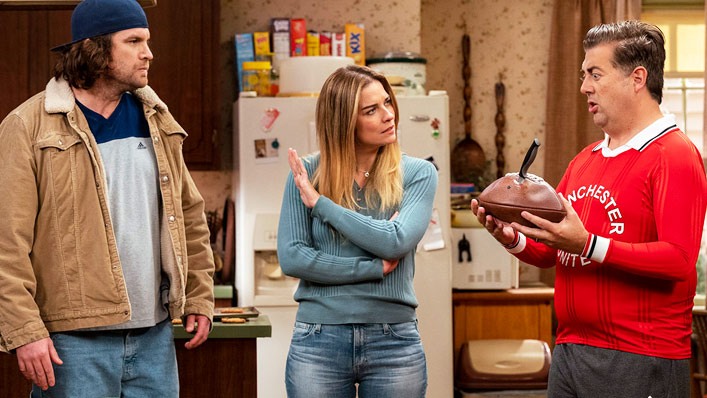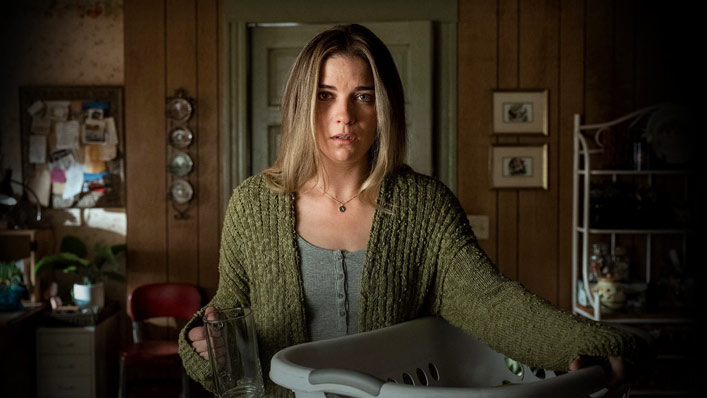The bitter brilliance and savage insight of Kevin Can F**k Himself

Kevin Can F**K Himself (now streaming on Prime Video) is a comedy series unlike any other. Liberating the ‘sitcom wife’ from an oppressive TV format, it asks big questions about both television and society, writes Luke Buckmaster.
In Molly Haskell’s great book about the history of women’s treatment in the movies, From Reverence to Rape, the author contemplates the behaviour of heroines from silent pictures by teasingly wondering “how may four-letter words were uttered that never made it into the titles.” The idea that women, or any characters, were dropping F bombs and cursing like drunken sailors in these old films—we just couldn’t hear them, because synchronised sound was yet to arrive—has amused me ever since.
See also
* Best new movies and shows on Prime Video
* All new streaming movies & series
But after watching the first four episodes of creator Valerie Armstrong’s bitterly dark and highly original comedy series Kevin Can F**K Himself—so bitter, in fact, and so dark, I’m not even comfortable calling it a comedy—I have a new appreciation of Haskell’s words. Like characters in the innovative MCU series WandaVision, which supposes that reality is a series of pop culture constructs, Armstrong’s protagonist Allison (Annie Murphy) is trapped in a world where she cannot be seen or heard (beyond the most literal meanings) because the ‘rules’ of the universe and the expectations of the audience watching have merged into the same oppressive space.

A truly twisted premise
The show’s core twist is that whenever Allison and her portly, pinheaded husband Kevin (Eric Petersen) share the same scenes, it is presented as a sitcom—with cheesy jokes, canned laughter, corny music. Whenever Kevin isn’t around it becomes a gritty drama, ditching an overlit aesthetic for a darker look and grimmer subject matter—focusing on the protagonist’s belittling day-to-day experiences, for instance, and how her rising resentment for her husband festers into a desire to kill him.
Watching the show switch between these two modes creates a tension I initially expected would have a reciprocal and reverse effect, rendering the comedy dramatic and the drama funny. Instead I found the entire experience bitterly acerbic, the metaness of the sitcom aspect especially tragic. The format exhibiting Allison’s life, and the world she is forced to inhabit, does not permit her to cry, or scream, or take a stand, allowing nothing but subservience.

The loud and obnoxious Kevin, we learn, has ruined them financially and taken away his wife’s independence, including destroying her once successful career. He regularly demeans and disrespects her. Listing the ways Kevin is selfish and sexist is difficult, because his traits are shared so widely in reality and popular culture, a fact which is made terribly apparent in the series.
Kevin’s gross sexism is always OK
Yet in the sitcom universe he can do no wrong. The first episode begins with Kevin and his doofus best friend Neil (Alex Bonifer) playing beer pong in Allison and Kevin’s lounge room: a Married…with Children-esque set reflecting the middle-class aspirations of working-class people (Kevin is a cable guy). The blokes are having a great time but then annoying old Allison, clutching a basket of clothes, in the middle of doing the laundry, has the gall to interrupt them, suggesting maybe this year her and Kevin can do something more adult for her anniversary. “Like a threesome?” he and Neil ask in unison. Insert canned laughter.
After a series of quippy exchanges, performed in that tightly wound sitcom style, where the end of every sentence is the beginning of a new hilarious setup, Allison enters the next room and the show changes for the first time. The colour palette is drained; a high pitched ringing and heartbeat dominates the soundtrack; we observe the anguished look on her face. She smashes the glass she’s holding—Kevin’s empty beer mug, because he asked for “a freshie”—and cuts her hand. Allison cries out “I’m fine!” but nobody is listening.
Should we reassess popular sitcoms?
Just as it’s accurate to say that the history of romantic comedies is really just a history of sexism, Armstrong makes it clear there’s something funny (not funny ha-ha) about a certain kind of sitcom in which the doofus male is always hilarious, and the spirit of the show always behind him, no matter how stupid and harmful his actions. Even and especially when those actions cause pain for others (think Everybody Loves Raymond, The King of Queens, Home Improvement, The Simpsons).
The reason we can’t see this pain in these programs—and why even pointing it out can seem like pious party-pooperism—is because the entire universe of each show, much like society itself, is engineered to support the fallacy that women are weaker and less deserving than men. Even when, at the same time, the same shows insist that women—Marge Simpson being a classic example—are more morally “pure.”
Molly Haskell wasn’t mucking around by opening the first chapter of From Reverence to Rape with the following sentence: “The big lie perpetrated on Western society is the idea of women’s inferiority, a lie so deeply ingrained in our social behaviour that merely to recognize it is to risk unraveling the entire fabric of civilization.” The genius of Kevin Can F**K Himself is that it finds a way to illustrate this unravelling, via that tense shift from sitcom to drama and back again. The show’s final, sobering message: all it took to recognize a woman’s suffering was a complete rearrangement of everything underpinning her universe.













